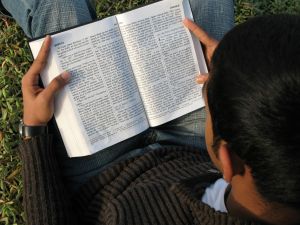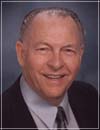What Is Clear Biblical Teaching? Part 2
by John C. Whitcomb, Th.D.
Read Part 1.
How does a person begin the lifelong process of theological discernment with regard to clear biblical teaching? It must begin with “an unction [enabling] from the Holy One,” which gives us such a potential for God’s truth that we “need not  that any man teach” us “all things” essential concerning Christ our Lord and the absolute truth of God’s Word (1 John 2:20, 27 KJV).
that any man teach” us “all things” essential concerning Christ our Lord and the absolute truth of God’s Word (1 John 2:20, 27 KJV).
Of course, this learning does not mean that we need no teachers! The apostle John himself, who wrote those words, was a divinely appointed teacher (cf. Matt. 28:18-20). It means that only the Holy Spirit of God, not any human teacher, however brilliant, can give us the ultimate assurance that biblical truth is ultimate truth. By that measuring stick, we can determine whether a messenger is communicating God’s truth or merely his own finite opinions (“Beloved, believe not every spirit, but try the spirits whether they are of God: because many false prophets are gone out into the world,” 1 John 4:1).
This measuring stick is how the Bereans could determine that the apostle Paul was speaking the truth about God when they heard him teach the Bible: “These were more noble than those in Thessalonica, in that they received the word with all readiness of mind, and searched the Scriptures daily, whether those things were so. Therefore many of them believed” (Acts 17:11-12).
Thus, Paul challenged his disciple Timothy, “Study to shew thyself approved unto God, a workman that needeth not to be ashamed, rightly dividing the word of truth” (2 Tim. 2:15). We all need to be challenged to study the Word because “iron sharpeneth iron; so a man sharpeneth the countenance of his friend” (Prov. 27:17).
I had an unforgettable experience in September of 1953. As a professor of Old Testament at a graduate school of theology, I had been teaching for two years the once-famous “gap theory” of Gen. 1:1-2. This theory accommodated the popular view that the earth was billions of years old by postulating a global catastrophe in Genesis 1:2 whereby trillions of plants, marine creatures, and other animals were supposedly smashed and fossilized long ages before Adam sinned.
This catastrophe would mean that Adam and Eve walked on a vast cemetery of once-living creatures they would never see alive. This would also require a re-creation of the animal kingdom in six days and a flood in Noah’s day that did not cover the world and form layers of sediment filled with fossils.
Then came a huge change in my understanding of the early chapters of Genesis. Dr. Henry M. Morris, a Christian geologist and hydrodynamic engineer, came to our school that fall to explain the magnitude and effects of the year-long deluge of Genesis 6 to 9. It was this catastrophe that changed the crust of the earth permanently. Genesis 1:2, then, is simply a description of the perfect but uninhabitable planet that God created at the beginning of the first day (see “Was the Earth Once a Chaos?” in J. C. Whitcomb, The Early Earth, for additional reasons why the Gap Theory cannot be correct).
I was deeply impressed with Dr. Morris’s careful handling of relevant passages of Scripture. This experience motivated me to devote several years to the study of the Genesis record and other passages dealing with the flood in Job, Psalms, Isaiah, Jeremiah, Matthew, Luke, Hebrews, and 1 and 2 Peter.
In 1957, my 538-page doctoral dissertation was completed, and Dr. Morris graciously agreed to co-author a volume that was published in 1961 and titled The Genesis Flood: The Biblical Record and Its Scientific Implications (Presbyterian and Reformed Pub. Co.). More than 300,000 of this book have been published in five languages; and many have concluded that it was the catalyst for the modern creation science movement.
Henry Morris is now with his Lord (since 2006). But how sad it would have been, in retrospect, if I had rejected his biblical insights because they contradicted the interpretations which I had previously espoused!
 Dr. John C. Whitcomb has been a professor of Old Testament and theology for more than 50 years and is widely recognized as a leading biblical scholar. He taught at Grace Theological Seminary (Winona Lake, IN) from 1951-1990 and gained much recognition for his work on The Genesis Flood (Presbyterian and Reformed Publishing Company), which he co-authored with Dr. Henry Morris in 1961. That book has been credited as one of the major catalysts for the modern Biblical creationism movement. His ministry homepage is Whitcomb Ministries, and his sermons are available at SermonAudio.com. Dr. John C. Whitcomb has been a professor of Old Testament and theology for more than 50 years and is widely recognized as a leading biblical scholar. He taught at Grace Theological Seminary (Winona Lake, IN) from 1951-1990 and gained much recognition for his work on The Genesis Flood (Presbyterian and Reformed Publishing Company), which he co-authored with Dr. Henry Morris in 1961. That book has been credited as one of the major catalysts for the modern Biblical creationism movement. His ministry homepage is Whitcomb Ministries, and his sermons are available at SermonAudio.com. |
- 4 views


Discussion